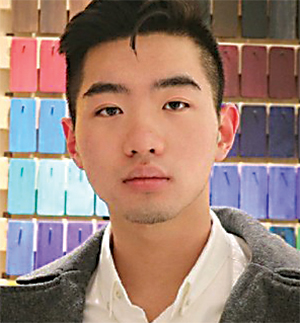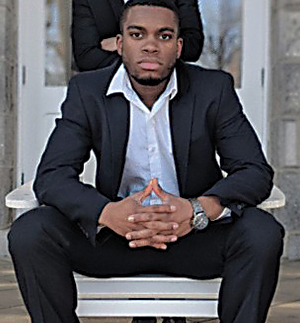common good
Counting Sleep: What happens when you mix a financial entrepreneur and an insomniac?
It was 4 a.m. Once again, Jason Jin ’20 was clacking away on his keyboard, disturbing his roommate’s sleep. “Jason had a lot of sleep issues,” says Josh Collin ’20. “And I got a front-row seat.”

Jason Jin ’20

Josh Collin ’20
“He was a lark with an elaborate morning routine,” Jin says ruefully.
Yet the Swarthmore roommates proved a good match. Jin grew fascinated with wearable health-tracking devices that can analyze sleep data, becoming principal investigator on a sleep study in Assistant Professor Maggie Delano’s engineering lab. Meanwhile, Collin founded SWIFT — Savings, Wealth, Investment, Finance, and Trade — a campus organization promoting financial literacy. After seeing Jin’s insomnia first-hand, Collin thought, “Someone has to solve this problem.”
Collin’s entrepreneurial instincts and Jin’s fascination with sleep devices combined. They launched Bioloop, a sleep-coaching company, from their dorm room, receiving mentoring and early funding from Swarthmore’s Center for Innovation and Leadership. Bioloop interprets data from devices like the Apple Watch, Fitbit, and Oura Ring.
Those devices are cool, says Collin, but too much data can be overwhelming. The pair’s idea was to add a human element to all the data — a sort of personal sleep-trainer — to help people stop bad habits (eating before bed, too much blue light from screens) and develop and maintain good ones (meditation, healthy wind-down routines).
“Sleep is something we brush aside,” says Collin. “But we’re hurting our own longevity. Sleep is this missing pillar of health.”
As for the former roommates? They’re currently housemates in San Francisco, sharing a house with 12 other founders and seven newly hatched companies. And they’re both sleeping a healthy 7–8 hours a night.
— HEATHER RIGNEY SHUMAKER ’91

Energy Movement
Following the announcement of the College’s ambitious energy plan this spring, Rosamund Stone Zander ’64 made a $5 million gift to help fund the geo-exchange plant that will be housed in the basement of the forthcoming Dining and Community Commons. In addition to the gift, Zander will also support a challenge: If the College community raises $1.5 million for the geo-exchange plant by June 30, 2022, she will match the sum to fully fund the $8 million project. “What we have done to our environment since the Industrial Revolution stands out as the most critical issue of our time,” says Zander, a family therapist and executive coach who also serves on the board of Climate Reality, a nonprofit group headed by former Vice President Al Gore. “I am thrilled to support this amazing project, having experienced that Swarthmore’s commitment to reducing carbon in the air, and sustainability overall, runs very deep indeed.” Learn more: bit.ly/GeoExchangeDCC